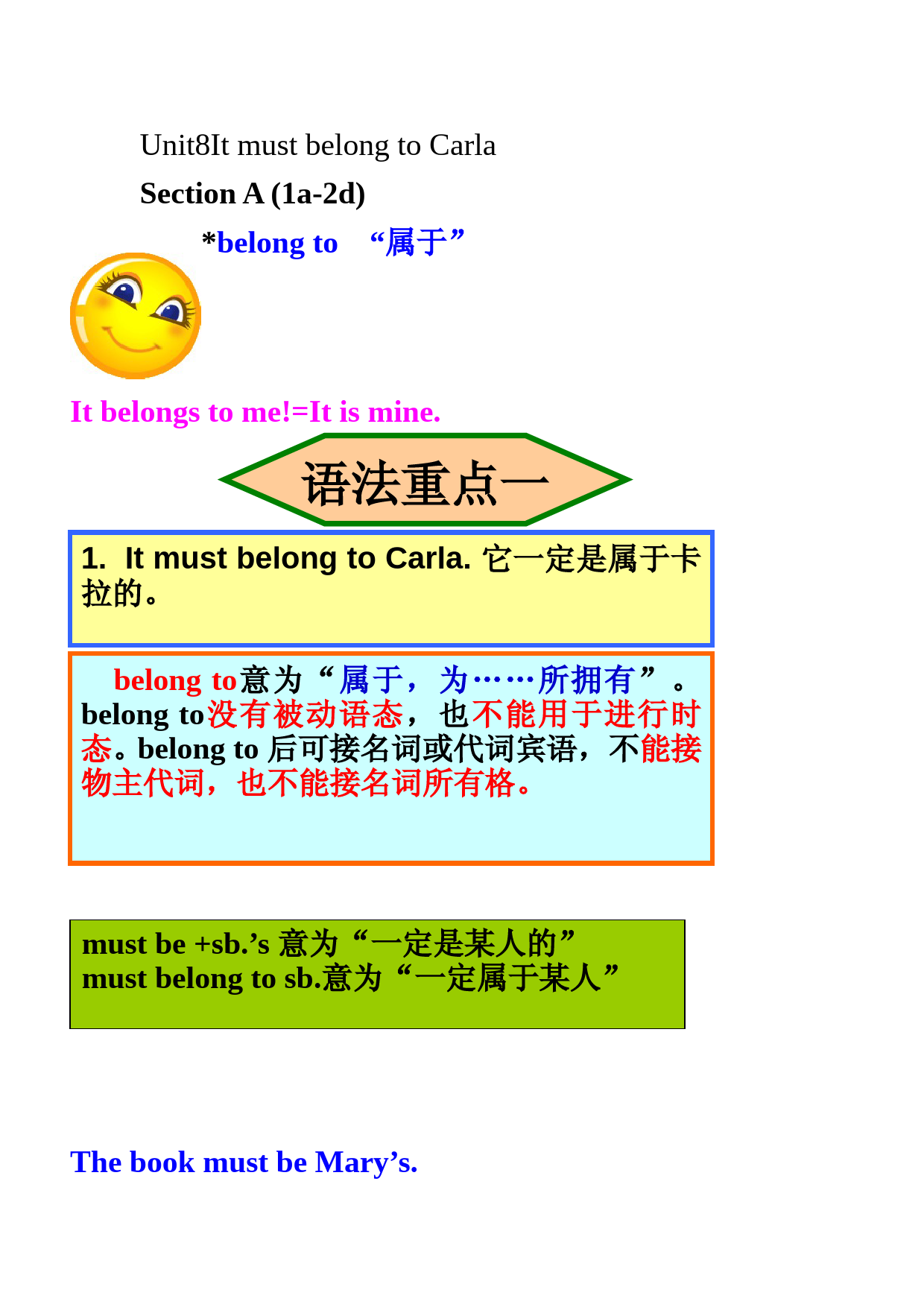人教版九年级英语Unit8It-must-belong-to-Carla语法经典总结
本作品内容为人教版九年级英语Unit8It-must-belong-to-Carla语法经典总结,格式为 doc ,大小 418304 KB ,页数为 31页

('Unit8ItmustbelongtoCarlaSectionA(1a-2d)belongto“属于”Itbelongstome!=Itismine.ThebookmustbeMary’s.语法重点一1.ItmustbelongtoCarla.它一定是属于卡拉的。belongto意为“属于,为……所拥有”。belongto没有被动语态,也不能用于进行时态。belongto后可接名词或代词宾语,不能接物主代词,也不能接名词所有格。mustbe+sb.’s意为“一定是某人的”mustbelongtosb.意为“一定属于某人”=ThebookmustbelongtoMary.语法重点二2.ItmustbeCarla’s.Shelovesvolleyball.它一定是卡拉的,她喜欢排球。(1)must为情态动词,无人称和数的变化,后接动词原形。如:---MustIfinishtheworkontime.---Yes,youmust./No,youneedn’t/don’thaveto.(2)此处must表示推断,通常与be连用,意为“一定是,肯定是”。must这种表示推测的用法只用于肯定句中如:Theremustbesomethingwrongwiththecomputer.注意在回答must引起的一般疑问句时,否定式常用needn’t或don’thaveto,意为“没必要”,而mustn’t表示“不准;禁止”。①must表示肯定推测时,其否定形式是can’t,意为“不可能”,表示有把握的否定推测。如:Wemustbewrong.(改为否定句)→Wecan’tbewrong.②might或could表示肯定推测时,意为也许是,可能是,其否定形式是can’t。如:Theredpencan’tbeLucy’s.Itmight/couldbeLily’s.语法重点三takepartin/attend/join这组词都有“参加,加入”的意思。3.Ican’tremember!Iattendedaconcertyesterdaysoitmightstillbeinthemusichall.我不记得了。昨天我参加了一场音乐会,所以我可能把它放在音乐厅了。(3A-4C)1.However,thesedays,somethingunusualishappeninginourtown.然而,这些天在我们小镇发生其区别是:takepartin侧重参加某项群众性、集体性的事业、工作或活动,突出参加者在其中发挥一定的作用。attend侧重参加或出席会议或学术活动等。join普通用词,指加入党派、团体或游戏活动等如:Weallattendedthemeeting.Ifyoujointheclub,youhavetoobeyitsrule.Peoplewhotakepartinsportsmustbeincondition.语法重点一一些不平常的事情。happen为不及物动词,意为“发生;碰巧”,指事情的发生带有一定的偶然性或不能预料。如:Theaccidenthappened3daysago.2happen有关的常用搭配:sth.happentosb.某人发生某事sb.happentodosth.某人碰巧做某事如:Whathappenedtoyoulastnight?Ihappenedtomeetoneofmygoodfriendsinthestreet.2.语法重点二(1)interview是动词,意为“面试;采访;会见”。表示“就某事采访某人”时用interviewsb.aboutsth.,beinterviewedby意为“被……采访”2.Whenhewasinterviewedbythetownnewspaper,hesaid,“Everynightwehearstrangenoisesoutsideourwindow.当小镇记者采访他的时候,他说:“每天晚上我听见窗户外面有奇怪的声音。此句含有when引导的时间状语从句,从句是一般过去时的被动语态,过去时的被动语态由“was/were+动词的过去分词”构成。如:ZhuJuninterviewedFengGongabouthisartexperience.Hehasinterviewedalotofpeopleforthejob.Thefamousstarisinterviewedbythereporters.(1)interview是动词,意为“面试;采访;会见”。表示“就某事采访某人”时用interviewsb.aboutsth.,beinterviewedby意为“被……采访”如:ZhuJuninterviewedFengGongabouthisartexperience.Hehasinterviewedalotofpeopleforthejob.Thefamousstarisinterviewedbythereporters.(2)noise名词,意为“嗓音;喧闹声”。如:Pleasedon’tmakenoisesinclass.HeismakingsuchaloudnoisethatIcan’tstudyhere.(2)anythingstrange意为“任何异常的”。形容词strange修饰不定代词anything。单个形容词作定语,一般放在名词的前面。但如果被修饰词是由some-,any-,every-和no-构成的不定代词时,用作定语的形容词必须放在它所修饰的不定代词的后面。如:Thereissomethingnewinhisreport.Isthereanythingimportant?语法重点二3.Myparentscalledthepolicemen,buttheycouldn’tfindanythingstrange.我父母报了警,但他们并没有发现任何异常。(1)callthepolice意为“报警”,其中police是单数形式表示复数意义,用作主语时谓语动词用复数形式。如:Thepolicearesearchingforamanwithabeard.第三课时B(1A-1D)如:Themanisrunningafterhissonbecausehedoesn’twanttodohishomework类似的词组还有:readafter跟着读如:Ourteacheroftenasksustoreadafterhim.上句常也用单词follow来表达。Ourteacheroftenasksustofollowhimtoread.3.awomanwithacamera一个带有相机的妇女语法重点一2.runafter在……后面跑、追语法重点二英语里表达“有,没有”,可以用therebe句型,have动词,介词with,without如:Hesitsonachairwithonlythreelegs.Theteachercameintotheclassroomwithoutabookinhishands.介词with,without作伴随状语。therebe句型表示“在……存在有”。如:Thereare50studentsinourclass.have动词表示某某拥有。如:Hehasalotoffriendsatschool.1.Hemightberunningtocatchabustowork.他可能是跑步去赶公车去上班。如:Idon’tknowwhetherwecancatchtheearlybus.Thecatcaughtamouse.第四课时(2A-2E)1.Stonehenge,arockcircle,isnotonlyoneofBritain’smostfamoushistoricalplacesbutalsooneofitsgreatestmysteries.巨石阵、岩石圈,不仅是英国最著名的历史古迹之一也是它的一个最大的奇迹之一语法重点三catch动词,意为“赶上;捕获”。过去式、过去分词均为caught,catchabus意为“赶上公共汽车”。语法重点一如:Shenotonlyplayswell,butalsowritesmusic.Notonlymenbutalsowomenwerechosen.HeworksnotonlyonweekdaysbutonSundaysaswell.注意:若连接两个成分作主语,其谓语通常与靠近的主语保持一致。如:Notonlyyoubutalsohehastoleave.若连接两个句子,notonly后面的句子要用倒装如:Notonlydidhespeakmorecorrectly,buthespokemoreeasily.2.Theythinkthestonescanpreventillnessandkeeppeoplehealthy.他们认为这些石头可以预防疾病,使人保持健康。语法重点二notonly…butalso用于连接两个表示并列关系的成分,着重强调后者,其意为“不但……而且”;其中的also有时可以省略。prevent作及物动词,可是直接带宾语,表示“阻止,阻挠”的意思;常构成:protect...from...表示“保护……不受……侵袭”;preventsb.fromdoingsomething.阻止某人做某事,在主动语态中from可以省略,被动语态中不行。3.“Andperhapswemightneverknow,butwedoknowtheymusthavebeenhardworking---andgreatplanners!”保罗•斯科特说“也许我们可能永远不会知道,但我们知道他们一定是勤奋——伟大的计划!”musthavebeendoing:表示肯定的猜测,肯定某人一直在做的事,并且猜测这种动作,或者行为一直持续到现在。musthavebeendone是musthavedone的被动形式,是对过去发生的动作最有把握的猜测,意思是“一定”。如:Sincetheroadiswet,itmusthaverainedlastnight.Theymusthavelearnt5000Englishwordsbytheendoflastterm,hadn\'tthey?语法重点三Theroommusthavebeencleanedyesterday,wasn\'tit?语法重点一1、ButI’mnotsureifhelikesrockmusic。但我不知道他是否喜欢摇滚乐。词组besure,makesure在祈使句中表示“确保、肯定”义。sbisnotsure意为“某人不知道”,相当于动宾结构的sbdoesn’tknow.Heisn’tsurewhentheclassmeetingwillbegin.=Hedoesn’tknowwhentheclassmeetingwillbegin.如:Besureyouwillgetthereatsixinthemorning.Makesuretheanswersareright.语法重点二2.SoImightbeabitlatefortheparty.因此我可能聚会要晚到一点。abit和alittle都作“一点儿”讲,但用法不同。(1)abit和alittle在肯定句中修饰动词、形容词、副词和比较级时可以互换,表示"一点儿"的意思。如:That\'sabittooexpensive.Thespeakerspokeupabit/alittletomakehimselfheardmoreclearly.(2)abit和alittle在否定句中的意思恰恰相反,notabit相当于notatall“一点儿都不”;notalittle相当于very(much)或extremely“很、非常”。Sheisnotabittired.=Sheisnottiredatall.Sheisnotalittletired.(3)abit用作定语时,意为“一点儿”,不能直接修饰不可数名词,但可用“abitof+不可数名词”结构,此时abitof=alittle.Hehasabitof/alittlemoneyleft.Sheknowsabitof/alittleFrench本单元的语法项目1.Weliveinasmalltownandalmosteveryoneknowseachother.WeusedtolivedinLondon.过去我们住在伦敦。Smallbirdslivemainlyoninsects.小鸟主要靠食昆虫为生。livein:居住liveon...sth:以食......为生表示猜测的常用表达方式有:(1)mustbe“肯定是……”,表示把握较大的推测。(2)may/might/couldbe“可能/或许是”,把握不大。(3)can’tbe“肯定不是……”,把握性很大的否定2.Theythinkitmightbethewind.HeisthinkingaboutgoingonatriptoAmerica.PleasethinkoverwhatI’vesaid.Ithinkthatitisagoodthing.选择1.Thisbook________beCarla’s.Hernameisonthebook.A.mightB.couldC.mustD.can’t2.Jack’sbikeisblue,sothisyellowone____behis.A.mustn’tB.can’tC.couldn’tD.mightn’t3.Theguitar________belongtoAlice.Onlysheplaystheguitarhere.A.couldB.must1.thinkabout+n./prep./-ing/从句:考虑,思索,回想,想起2.thinkover+n./从句:仔细想想,仔细考虑3.think+n./prep./todo/从句C.can’tD.can4.-Whatdoyouthink“upset”mean?-I’mnotsure.It________meansad.A.mustB.canC.mightD.can’t5.I’llhaveatest______writingnextweek.A.atB.ofC.onD.in6.Thisbackpackmustbe________.Isawhercarryityesterday.A.LucysB.LucyC.Lucys’D.Lucy’s翻译1.这本书一定是李雷的。他正在找这本书。ThisbookmustbeLiLei’s.Heislookingforthebook.2.这个发带可能是韩梅的。她喜欢戴发带。ThehairbandcouldbeHanMei’s.Shelikeswearingahairband.3.这个玩具熊可能是约翰妹妹的。她还是个小姑娘。ThetoybearmightbelongtoJohn’ssister.Sheisalittlegirl.4.这个排球不是玛丽的。她一点也不喜欢打排球。Thevolleyballcan’tbeMary’s.Shedoesn’tlikeplayingvolleyballatall.Comeon,whyaren’tyoudancing?Enjoyyourselves!来吧,你们为什么不跳舞呢?尽兴玩吧!Weusedtohavegreattimestalkingtogether.我们曾经常常交谈,很是开心。It’snofundoingsuchboringthingsonyourown.自己独自干这种无聊的事情很是无聊。havefun(doingsth.)玩得高兴;过得愉快类似:enjoyoneselfenjoydoingsth.haveagood/great/lovelytime(doningsth.)反义:It’snofun/notmuchfundoingsth.玩得不高兴;过得不舒坦玩得不高兴;过得不舒坦翻译1.在你玩得开心的时候,时间就会飞逝而过。Timefileswhenyou’rehavingfun.2.起早贪黑的工作可不是件愉快的事情。It’snotmuchfunburningthecandleatbothends.3.我的妻子它可能是一种动物,但我的朋友和我认为肯定是孩子们在玩耍。Mywifethinksthatitcouldbeananimal,butmyfriendsandIthinkitmustbeteenagershavingfun.4.一定有东西闯入我们社区,但那是什么?Theremustbesomethingvisitingthehomesinourneighborhood,butwhatitis?1.Thatman______bemyEnglishteacher.HehasgonetoCanada.A.needn’tB.mustn’tC.can’t【考点点拨】考点例析考查情态动词辨析。needn’t意为“不必”;mustn’t表示“明令禁止”;can’t表示“不可能”。根据句意“那个男人不可能是我的英语老师。他去了加拿大。”故选C。考点一:考查表示“能力”的情态动词1.—________yourAustralianfriendeatwithchopsticks?—Yes,butshecan’tusethemwell.A.ShouldB.NeedC.CanD.Must2.Theworkistoohardforus.We_______finishitontime.A.can’tB.mustn’tC.shouldn’tD.needn’t3.—Couldyourfatherplaygolfwhenhewasyoung?—No,he________.Buthe________playtabletennis.A.couldn’t;couldB.needn’t;mightC.mustn’t;shouldD.shouldn’t;need【考点点拨】★情态动词can表示“能力”时,与beableto同义,其否定形式为can’t。can表示现在的能力,其过去式could表示过去的能力。考点二:考查表示“应该”的情态动词1.—________wetofinishourhomeworkbeforenoon?—Yes,you________.A.Need;canB.Have;doC.Ought;oughttoD.Should;must2.You________studyhardifyouwanttobeascientistinthefuture.A.mayB.shouldC.wouldD.could【考点点拨】★情态动词should和oughtto都可表示“应该”,但should侧重说话者主观的看法,而oughtto更侧重客观情况。★should的否定形式为shouldn’t,oughtto的否定形式为oughtn’tto或oughtnotto。考点三:考查表示“请求;许可”的情态动词及其回答1.—________Iborrowyourmath\'sbook?—Sure.Hereyouare.A.NeedB.WillC.MayD.Must2.—________Itakesomephotosinthehall?—No,you________.Lookatthesign“Nophotos”!A.Can;needn’tB.Must;mustn’tC.Should;needn’tD.May;mustn’t3.—CouldIuseyourdictionaryforawhile?—Yes,ofcourseyou________.A.couldB.canC.willD.should【考点点拨】★情态动词may和can都可表示“请求;许可”。may比can正式,could在表示“请求;许可”时,既可表示过去,也可表示语气的委婉。★当“May/Can/CouldI…”表示“请求;许可”时,肯定回答常用“Yes,please.”/“Certainly.”等,否定回答常用“No,youcan’t/mustn’t.”等。考点四:考查表示“推测”的情态动词1.—IsawLilyinthesupermarketthismorning.—Oh,it________her.ShemovedtoAustraliathedaybeforeyesterday.A.canbeB.mustbeC.can’tbeD.mustn’tbe2.Afteralongwalk,thechildren________beverytirednow.A.willB.mustC.havetoD.can3.John________gowithustomorrow,butheisn’tsure.A.mustB.canC.needD.may【考点点拨】★may,can,must都可表“推测”,三者的可能性依次递增。★may和must表“推测”常用于肯定句中,can表“推测”常用于否定句和疑问句中。考点五:考查need,must和haveto的用法1.Jim,you________playwiththeknife.You________hurtyourself.A.won’t;can’tB.mustn’t;mayC.shouldn’t;mustD.can’t;shouldn’t2.—________Ihavetohandinmyhomeworknow,MrZhang?—Yes,youdo.A.DoB.CanC.MayD.Must3.—MustIgetupbeforesixo’clocktomorrowmorning,Dad?—No,you________.TomorrowisSaturday.Youmaygetupalittlelater.A.mustn’tB.can’tC.needn’tD.maynot4.It’stoolate.We________gohome,orwe’llbeblamed(责备).A.canB.mayC.mightD.haveto【考点点拨】★need作情态动词,意为“需要”,后接动词原形,常用于否定句、疑问句和条件句中。★must意为“必须”,强调主观看法。对must引导的一般疑问句,肯定回答常用“must”,否定回答常用needn’t或don’thaveto。mustn’t意为“一定不要;禁止”。★haveto意为“不得不;必须”,强调客观情况下需要做某事,有人称、数和时态的变化,变否定句和疑问句时需要借助助动词完成句型的变化。Wecan’tcarrytheheavybox.Hemaycometomorrow.Wemuststudyhard.不能独立做谓语。表示说话人语气、情感或态度,无人称和数的变化(haveto除外)can(could),may(might),should,oughtto,must,need,haveto,etc.跟动词原形(有自己的词汇意思)情态动词例句意义例词特点分类1.Theroomisbigenough.It________hold100people.A.canB.mustbeC.needD.haveto2.—Mr.Wang,canIfinishmyhomeworktomorrow?—Sorry,you________.A.can’tB.don’tC.needn’tD.won’t3.—WhoseT-shirtisthis?—It________beJohn’s.It’smuchtoosmallforhim.A.mayB.mustC.can’tD.shouldn’t4.Thetalentedboy________writelyricswhenhewasattheageoften.A.mayB.couldC.must5.—Bob,shallwegoandmeetournewclassmate?—Sorry.I’mbusynow.Butyou______askDavidtogowithyou.Heisfree.A.needB.mayC.wouldD.must6.—______Iborrowyourhistorybook?—Sure.Hereyouare.A.MustB.MayC.NeedD.Will7.Cars,busesandbikes________stopwhenthetrafficlightschangetored.A.canB.mayC.mustD.need8.Themagazine________beLily’s,forwecanfindhernameonthecover.A.mayB.mightC.couldD.must9.—MustIgetupearlytomorrowmorning?—No,________.A.youmustn’tB.Idon’tthinkyouhavetoC.youcan’tD.youneed10.—Lookatthesign!—Oh,Isee.We________wastewater.A.canB.mustC.mustn’tD.needn’tSectionB根据句意及汉语提示写出所缺的单词。1.Thereissomethingstrangeflyinginthe_____(天空).2.Heisnotstrongenoughto_____(举起)theheavystone.3.Look!The_________(猴子)arepeelingbananas.4.Thepoorboywas__________(采访)bydifferentTVstationsafterthataccident.5.Hisfatherworksasaworkshop_________(主任)inabigfactory根据句意及汉语提示写出所缺的单词。1.Thereissomethingstrangeflyinginthe_____(天空).2.Heisnotstrongenoughto_____(举起)theheavystone.3.Look!The_________(猴子)arepeelingbananas.4.Thepoorboywas__________(采访)bydifferentTVstationsafterthataccident.5.Hisfatherworksasaworkshop_________(主任)inabigfactory.skyliftmonkeysintervieweddirector用括号内所给单词的正确形式填空。1.Thewomancouldbe_________(run)forexercise.2.Therearesomeboys______(fly)kitesinthepark.3.Alicewas_________(happy),becauseshedidn’tpassthemathexam.4.MrsWhitelooks_________(extreme)anxiousnow.5.Nevertellalie.Peopledon’tlikethosewhoare_________(honest).',)
提供人教版九年级英语Unit8It-must-belong-to-Carla语法经典总结会员下载,编号:1700706581,格式为 docx,文件大小为31页,请使用软件:wps,office word 进行编辑,PPT模板中文字,图片,动画效果均可修改,PPT模板下载后图片无水印,更多精品PPT素材下载尽在某某PPT网。所有作品均是用户自行上传分享并拥有版权或使用权,仅供网友学习交流,未经上传用户书面授权,请勿作他用。若您的权利被侵害,请联系963098962@qq.com进行删除处理。
